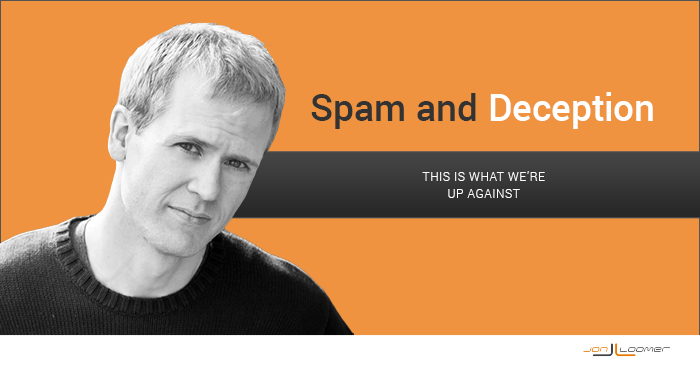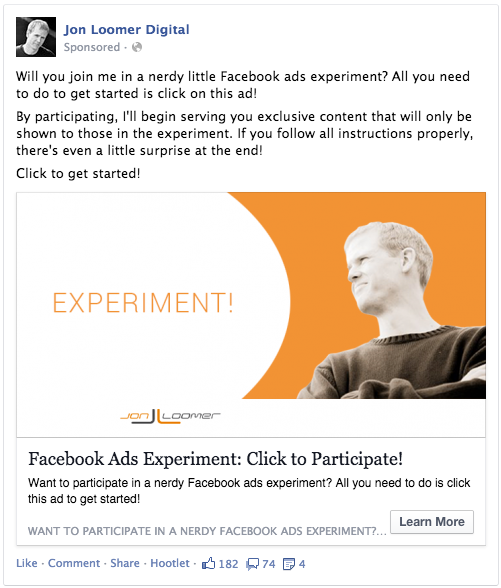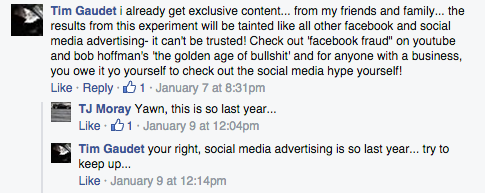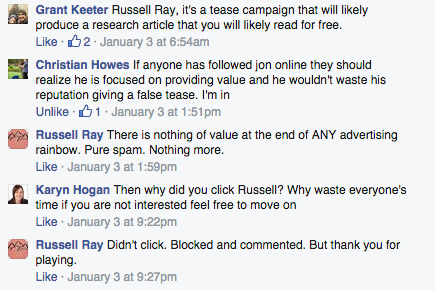
[AUDIO VERSION: I also recorded an audio version of this blog post. Click below to listen. Let me know if this is something you find helpful!]
As you may already know, I started a little experiment on New Years Eve. I won’t completely rehash the experiment here (read this explanation), but here are the highlights:
- I want to challenge marketers to serve content via ads that is exclusive and provides value
- I created a campaign inviting people to participate
- Those who want to participate will be served exclusive content via ads
- I am spending money to serve ads that allow people to opt out of seeing these ads
- I am committing at least $3,000 as part of this experiment
There are no strings attached. You aren’t forced to provide an email address to view the content. I’m not selling you anything. I’m simply curious about how we can innovate in the area of Facebook advertising and make ads something that people actually want to see — rather than tricking them, which is far too often the strategy.
This approach is going to seem too good to be true to some, particularly those who don’t follow me closely. And unfortunately, so much damage has been done by advertisers that our group as a whole simply isn’t trustworthy.
The Typical User Doesn’t Trust Us
Granted, the vast majority of responses to the ads in my experiment have been positive. And knowing that as much as 80% of the distribution has been organic due to the insane engagement on these ads, I have to expect the occasional troll who stumbles upon it without being targeted.
For some background, here’s a look at my ad that invites people to participate in my experiment.

The ad targeting my fans has received a ton of responses. Here’s one of them:

Some common themes here:
- User prefers content from friends and family
- Social media advertising is tainted
- Social media advertising can’t be trusted
- The “Facebook Fraud” video is proof
I appreciated TJ’s response because he’s correct. The Facebook Fraud video was “so last year.” Just about everything is “so last year,” but that video in particular is about a year old now.
Those who choose to participate in my experiment see this “Welcome” ad (yes, I spent money on an ad welcoming participants):

Following was one of the comments…

I tend to stick strictly to the rule of “don’t feed the trolls,” but I unfortunately couldn’t help myself.
Later in the thread, some of my awesome readers came to my defense, but that didn’t deter our friend Russell…

Some more common themes here:
- An old trick that offers nothing of value
- I’m promising something for nothing, but that will never happen
- Ads offer nothing of value
- Ads are spam, nothing more
Remember: This is a “Welcome” ad to anyone who clicked my ad to participate. So Russell could only see this if he were participating (not likely) or a friend of his was (awesome friend).
He didn’t click, he said. My favorite part: HE BLOCKED ME AND COMMENTED!
There is Damage to Be Undone
I’m not sharing this with you to get sympathy. I’m not hoping to rile the troops to go out and attack Tim and Russell.
Instead, I’m glad they shared. Their reactions are common. I’d say that they represent a very large group of people — if not a majority, a very vocal minority.
We can’t be trusted. Advertisers never offer anything of value. Ads are only spam. OUR CONTENT IS TO BE BLOCKED!
To a point, I completely agree with this. And if they don’t know me, why would my ads be any different?
This is why it’s so important that we put aside our strategies of the past. I challenge you to think differently. Think of ways that you can offer value with your advertising instead of thinking only about how you can get the immediate buck.
That doesn’t mean your advertising should result in a negative ROI. I firmly believe that this approach can be taken and lead to profits — possibly huge profits.
But it’s a matter of playing the long game rather than the short game, which is a phrase I’ve said and written repeatedly the past few months.
When we build a community, we talk about attracting people who like us. Who love us. Who trust us.
We educate. We entertain. We inform.
But when it’s time to advertise, that often goes out the window. We go straight to the sale, often accompanied by deceptive copy and claims.
That’s old school. That’s “so last year.” If it continues to be your approach in 2015 and beyond, you will be left behind.
Your Turn
What are your thoughts? Is it time for advertisers to get more creative? Do we deserve the negative response this industry tends to receive?
Let me know in the comments below!






